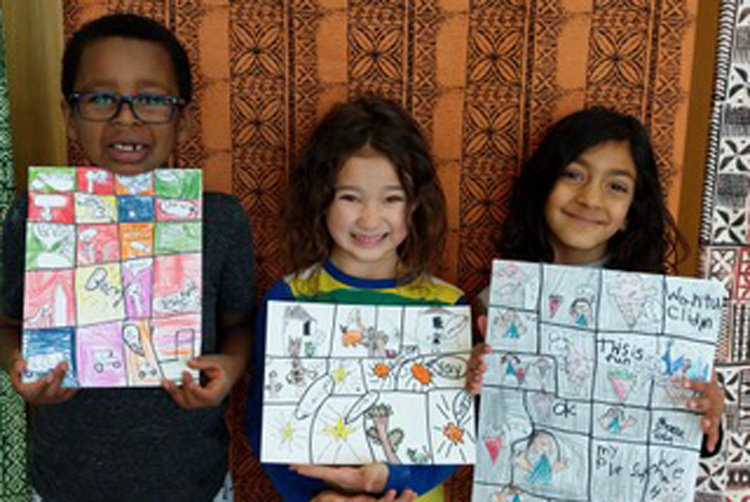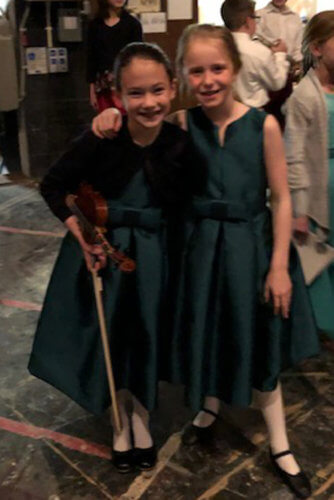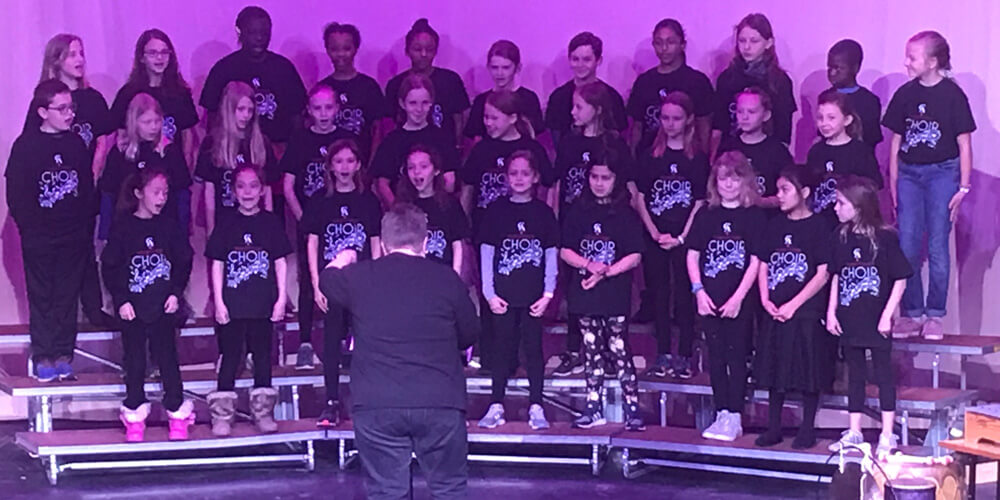True confession—I was never the parent to post on the refrigerator every single crayon drawing that my children brought home, although I did suffer through trying to guess correctly what each one was. Nor did I offer excessive praise of their stick and glue sculptures that lived on our kitchen counter for an inexpressible stretch of time. However, I find there is something remarkable about the way a child is sublimely able to live a life in art and envision it as an organic part of their days. It is an emergence rather than a juxtaposition, part of who they are and not just what they do, and, with some envy, I will say it is a particular experience that is difficult to replicate as we grow older. Picasso says of painting, “It took me four years to paint like Raphael, but a lifetime to paint like a child.”
Moontellers & Elemental Dreams
This past month saw the realization of two Colorado Academy Lower School productions—Fourth Grade, and Fifth Grade and the Fourth-Fifth Grade Choir. The Fourth Grade production was entitled Moontellers, and the large drum disks that hung over the stage revealed in light the children’s imagination of what figures are seen reflected in the moon. There were stories from Polynesia, Scandinavia, the Côte D’Ivoire, and from the Iroquois, all adapted by the students under the guidance of Lower School music teachers Nora Golden and Brenda Bartel.
What all these stories had in common was the exploration and lure of how we look at the moon, and they were indeed very dreamlike. Using rhythm and recorders, voice and movement, the students lived fully and genuinely through this orbit of storytelling. Andy Beck’s alluring song, “The Moon,” was sung throughout and became the intrinsic thread which set a distinct mood—discerning and thoughtful. These students were able to enkindle an atmosphere in performance that was so intensely real that it felt tangible to the audience—as though you were there, in the dark, touching the sky, with the moon as your only focus.
Grade Five performed a student collaborative project between music and art, entitled Elemental Dreams. The quote on the top of the program by O’Shaughnessy told us—We are the music makers…and we are the dreamers of dreams. I paused when I read this, because, while of their own accord our students may remain music makers, as parents and educators we are entrusted with honoring their dreams, whatever those may be, whatever they become, even if seemingly impossible to our more weathered minds.
On my way out of the theater that morning, I asked a number of children with elated faces how they felt about their performance. One child told me, “I want to do it again right now.” Another said, “I wish I could live on this stage.” Still another child said one word: “Abracadabra.” I smiled, because in the Upper School we have a tradition of giving each other “magic” before every show, and here were these little ones showing us up by doing what comes naturally to them.

Magic makers
We can take a lesson from these artistic dreamers and magic makers. Their success is based upon a couple of simple principles that I have observed. First of all, they haven’t filtered out their receptors yet. During my recent visit to Angela Hottinger’s First Grade class, students were working on comic strips—frame by frame. Some were quite sophisticated in depicting detail; others explored more color than I thought a sheet of paper could hold, but all showed a footloose openness to the undertaking assigned to them.

Second, children are able to exist in the very moment without watching themselves perform at every turn. At the March 11 Chamber Music Recital, the “Vioanoellos” (each group chooses its name) sat on stage poised, instruments tuned and ready to play, while the audience noisily spilled into the theater. All Third Graders and fine musicians, they even endured the flutter of family cameras and orders to “look at me” and “smile,” not to mention the barrage of adults standing about them admiring their serenity, and let’s face it—cuteness. When the house fell silent as the concert was about to begin, they waited for the nod from their instructor/conductor, Becky Burchfield, and then launched into a well-rehearsed and ardent performance of the traditional Shaker melody, “Simple Gifts.” The title says it all about who they are and what they can teach the rest of us to be.
Finally, children are holders of uncaged passion. They can’t help themselves. Laughter is spontaneous; so are tears. They will run across the music building to give you a hug, and they may also tirelessly re-work a piece of choreography they are teaching others in a class until they feel it is exactly the way they want it. They live on the edge in real time with their wits about them, brimming with abundant enthusiasm that inches towards hilarity at moments, but that is part of the joy of being a child, as well as the satisfaction and challenge of being a Lower School teacher. That is also why it is essential that schools offer rich programs in visual and performing arts to younger students, as we do at CA.
Enchantment is part of the aesthetic universe, and that is an element we can experience as we become adults. If we are inclined, we can carry it with us wherever we go, and it will paint a comely wash on our constant worlds. William Shakespeare’s Prospero says in The Tempest, “We are such stuff that dreams are made on…” It is an empowering invocation, because it suggests that we have in us the breath to make dreams real in this sphere, to make magic happen, and even if, in reflection, we fret about the future of the arts, or our ability as adults to excel at any art, we need only to take a step back and ask, “What would my six-year-old self do?” Then we can allow ourselves to sing in the car, pick up a paintbrush, dust off that clarinet, or tap dance in the streets and—Abracadabra!—dream of the moon.
